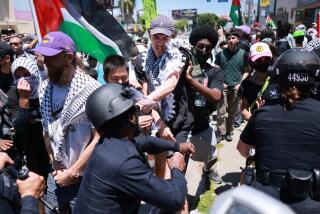Israeli police, Palestinian protesters clash
- Share via
JERUSALEM — Israeli police stormed the grounds of Al Aqsa mosque Sunday, using clubs and stun grenades to subdue hundreds of stone-throwing Palestinians in the worst clashes in a month of unrest in and around Jerusalem’s Old City.
The rioting, which caused no fatalities and subsided after a few hours, did not appear to portend a large-scale Palestinian uprising. But it sprang from increasing tensions stoked by Jewish and Islamic extremists that could keep Jerusalem and its contested holy sites on edge for weeks to come.
It also is expected to keep Israel on the defensive against international criticism like the sharp protests registered Sunday by Egypt, Jordan and the 22-member Arab League over what their officials called Israeli provocations at Islam’s third-holiest shrine.
The black-domed mosque is enclosed in a compound revered by Jews as the Temple Mount and by Muslims as the Noble Sanctuary.
Israel denied starting the trouble.
Police spokesman Micky Rosenfeld said police on routine early morning patrol came under attack by about 50 Muslim protesters. The group had been summoned by Islamic political and religious leaders to “protect” the compound against what it claimed was a planned demonstration Sunday by religious Jews.
Dozens of police reinforcements rushed in behind plastic shields, many of them slipping on oil poured by protesters over the stone pathways of the esplanade. The protesters fought back with rocks, plastic chairs and a firebomb before retreating into the mosque.
The disorder did not dis- turb Jewish prayers at the Western Wall, at the foot of the compound. But it spilled into the surrounding alleyways of the Old City and adjacent Arab neighborhoods, where clusters of young Palestinian men threw rocks and bottles from street level and from rooftops.
A second clash outside the mosque occurred in midmorning as larger groups of police and protesters converged. Dozens of protesters holed up inside the mosque for several hours, occasionally opening the doors to throw objects at the police.
Israeli forces did not enter the building and they withdrew from the compound in the afternoon. Later, the protesters left the mosque and the compound was closed.
Nineteen Palestinians, most of them beaten by clubs, and nine policemen were reported injured. Irris Mackler, an Australian journalist reporting for the Canadian Broadcasting Corp., was hospitalized with a broken jaw after she was hit by a rock outside the compound.
Police arrested 18 Palestinians, including two political leaders accused of incitement.
One was Ali Abu Sheikha, a top official of the Northern Branch, the extremist wing of the Islamic Movement. Police turned back several busloads of Jerusalem-bound protesters organized by the group from Arab communities in northern Israel, where the movement is based.
The other arrested leader was Hatem Abdel Kader, a senior figure in Fatah, the dominant Palestinian movement in the West Bank. He was taken into custody after leaving the mosque.
Religious and nationalist sentiment has long made the site a tinderbox. Muslims believe the prophet Muhammad ascended to heaven from the compound, which is also home to the gilded Dome of the Rock shrine. Jews revere the place as the site of their first and second temples.
The compound has been under Israeli control since its capture from Jordan in the 1967 Middle East War, but it is administered by a Muslim religious trust. An agreement between Israel and the trust allows Israeli and other non-Muslim visitors but prohibits them from holding organized prayer sessions.
Right-wing Jewish groups, saying their rabbis and other members are harassed during visits, have been calling for a more assertive Jewish presence on the Temple Mount.
In an interview before his arrest, Kader said Sunday’s rioting erupted after protesters saw what they believed to be a small group of Jewish settlers entering the compound under police protection.
Rosenfeld, the police spokesman, said no Jewish civilians entered the place before or during Sunday’s disturbances.
Palestinian Authority President Mahmoud Abbas’ office condemned the police action, calling it part of a tightening of Israeli control over Jerusalem and its holy sites. The Palestinians want the eastern part of Jerusalem as the capital of a future state.
Officials on both sides have warned that the current impasse in U.S.-brokered talks on Palestinian statehood, which broke off last December, is raising the level of tension in the city.
In a recent interview with the newspaper Haaretz, Sheik Raed Salah, the fiery Northern Branch leader, warned that disorders in Jerusalem are bound to continue until Israel “withdraws” from contested areas.
“No one has rights to the Al Aqsa mosque other than the Muslims,” he said. “The mosque compound is Muslim, Palestinian and Arab, and Israel has no rights to the mosque or East Jerusalem.”
--
Special correspondent Maher Abukhater contributed to this report.
More to Read
Sign up for Essential California
The most important California stories and recommendations in your inbox every morning.
You may occasionally receive promotional content from the Los Angeles Times.













